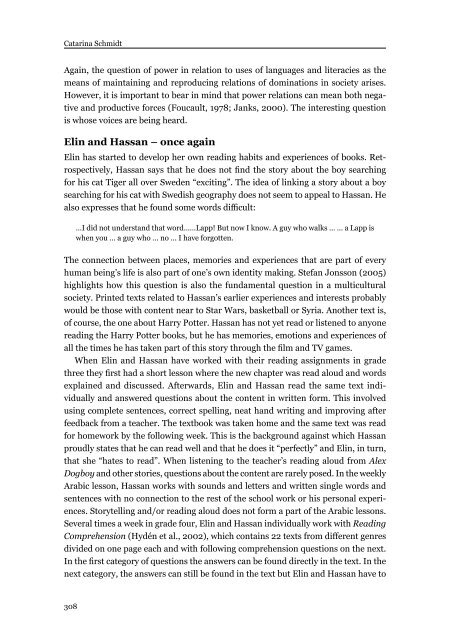Download issue - Umeå universitet
Download issue - Umeå universitet
Download issue - Umeå universitet
You also want an ePaper? Increase the reach of your titles
YUMPU automatically turns print PDFs into web optimized ePapers that Google loves.
Catarina Schmidt<br />
Again, the question of power in relation to uses of languages and literacies as the<br />
means of maintaining and reproducing relations of dominations in society arises.<br />
However, it is important to bear in mind that power relations can mean both negative<br />
and productive forces (Foucault, 1978; Janks, 2000). The interesting question<br />
is whose voices are being heard.<br />
Elin and Hassan – once again<br />
Elin has started to develop her own reading habits and experiences of books. Retrospectively,<br />
Hassan says that he does not find the story about the boy searching<br />
for his cat Tiger all over Sweden “exciting”. The idea of linking a story about a boy<br />
searching for his cat with Swedish geography does not seem to appeal to Hassan. He<br />
also expresses that he found some words difficult:<br />
…I did not understand that word……Lapp! But now I know. A guy who walks … … a Lapp is<br />
when you … a guy who … no … I have forgotten.<br />
The connection between places, memories and experiences that are part of every<br />
human being’s life is also part of one’s own identity making. Stefan Jonsson (2005)<br />
highlights how this question is also the fundamental question in a multicultural<br />
society. Printed texts related to Hassan’s earlier experiences and interests probably<br />
would be those with content near to Star Wars, basketball or Syria. Another text is,<br />
of course, the one about Harry Potter. Hassan has not yet read or listened to anyone<br />
reading the Harry Potter books, but he has memories, emotions and experiences of<br />
all the times he has taken part of this story through the film and TV games.<br />
When Elin and Hassan have worked with their reading assignments in grade<br />
three they first had a short lesson where the new chapter was read aloud and words<br />
explained and discussed. Afterwards, Elin and Hassan read the same text individually<br />
and answered questions about the content in written form. This involved<br />
using complete sentences, correct spelling, neat hand writing and improving after<br />
feedback from a teacher. The textbook was taken home and the same text was read<br />
for homework by the following week. This is the background against which Hassan<br />
proudly states that he can read well and that he does it “perfectly” and Elin, in turn,<br />
that she “hates to read”. When listening to the teacher’s reading aloud from Alex<br />
Dogboy and other stories, questions about the content are rarely posed. In the weekly<br />
Arabic lesson, Hassan works with sounds and letters and written single words and<br />
sentences with no connection to the rest of the school work or his personal experiences.<br />
Storytelling and/or reading aloud does not form a part of the Arabic lessons.<br />
Several times a week in grade four, Elin and Hassan individually work with Reading<br />
Comprehension (Hydén et al., 2002), which contains 22 texts from different genres<br />
divided on one page each and with following comprehension questions on the next.<br />
In the first category of questions the answers can be found directly in the text. In the<br />
next category, the answers can still be found in the text but Elin and Hassan have to<br />
308

















